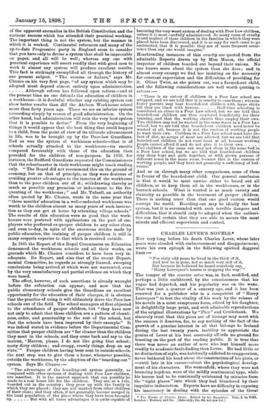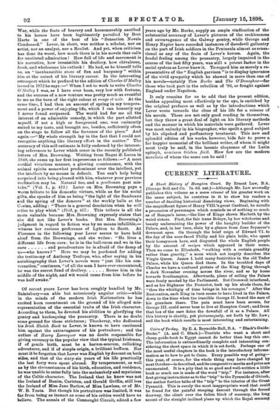CHARLES LEVER'S NOVELS.*
Nom very long before his death Charles Lever, whose later years were clouded with embarrassment and disappointment, wrote his own epitaph in the following spirited doggerel lines :—
" For sixty odd years he lived in the thick of it,
And now he is gone, not so much very sick of it, But because he believed he heard somebody say, Harry Lorrequer's hearse is stopping the way.'"
The temper of the consist& satur was, in fact, modified, and perhaps a little embittered, by the consciousness that his vogue had departed, and his popularity was on the wane. That was just a quarter of a century ago, and it has been reserved for a publisher who is a compatriot of "Harry Lorrequer" to test the vitality of his work by the reissue of his novels in a most sumptuous form, edited by his daughter, in delightfully large print, and with admirable reproductions of the original illustrations by "Phiz " and Cruikshank. We sincerely trust that this pious act of homage may meet with the success it deserves, for, to say nothing of the fact of the growth of a genuine interest in all that belongs to Ireland during the last twenty years, inability to appreciate the genius of Lever at his best assuredly affords no ground for boasting on the part of the reading public. It is true that there was never an author of note who lent himself more readily to academic fault-finding than Lever. He had little or no distinction of style, was habitually addicted to exaggeration, never bothered his head about the construction of his plots, or —until late in his career—about the psychological develop- ment of his characters. His womenfolk, where they were not bouncing hoydens, were of the mildly sentimental type, while his heroes had to be continually extricated by miracles from the "tight places" into which they had blundered by their impulsive indiscretion. Experts have no difficulty in exposing his inaccuracy in dealing with the episodes of the Great
• The Novels of Charles Lever. Edited by hl Daughter. Vols. I. to VIII. London Downey and O. [Sets only, 10s. d& net per roll War, while the feats of bravery and horsemanship ascribed to his heroes have been legitimately parodied by Bret Harte in one of the best of his "Sensation Novels Condensed." Lever, in short, was neither a scholar, nor an artist, nor an analyst, nor a Realist. And yet, when criticism has done its worst, how much there is in his novels that calls for unstinted admiration ! How full of life and movement is his narrative, how irresistible his drollery, how chivalrous, fresh, and wholesome his outlook ! He had, as he himself tells us, an "inexhaustible store of fun and buoyancy" within him at the outset of his literary career. In the interesting retrospect which he prefixed to the edition of Charles O'Malley issued in 1872 he says :—" When I set to work to write Charles O'Malley I was, as I have ever been, very low with fortune, and the success of a new venture was pretty much as eventful to me as the turn of the right colour at rouge et noir. At the same time, I had then an amount of spring in my tempera- ment and a power of enjoying life, which I can honestly say I never found surpassed. The world had for me all the interest of an admirable comedy, in which the part allotted myself, if not a high or foreground one, was eminently suited to my taste, and brought me, besides, sufficiently often on the stage to follow all the fortunes of the piece." And again :—" My whole strength lay in the fact that I could not recognise anything like literary effort in the matter." The accuracy of this self-estimate is fully endorsed by the interest- ing references to Lever which occur in the recently published letters of Mrs. Browning. Writing from Bagni di Lucca in 1849, she sums up her first impressions as follows :—" A most cordial vivacious manner, a glowing countenance, with the animal spirits somewhat predominant over the intellect, yet the intellect by no means in default. "You can't help being surprised into being pleased with him, whatever your previous inclination may be. Natural too, and a gentleman past mis- take." (Vol. I., p. 413.) Later on Mrs. Browning pays a warm tribute to his domestic virtues, while as for his social gifts, she speaks of him as being "the light of the flambeaux and the spring of the dancers" at the weekly balls at the C isino, adding : "There is a general desolation when he will retire to play whist." (Mid, p. 417.) This tribute is all the more valuable because Mrs. Browning expressly states that she did not like Lever's books. But Mrs. Browning's judgment in regard to fiction was by no means infallible,— witness her curious preference of Lytton to Scott. At Florence in the following year Lever seems to have held aloof from the Brownings, and she writes : "He lives a different life from ours : he is in the ball-room and we in the cave and peradventure he is afraid of the damp of us—who knows ? " Here we may be pardoned for adding the testimony of Anthony Trollope, who, after saying in his autobiography that Lever's novels were "just like his con- versation," continues, "of all the men I have ever encountered,
he was the Barest fund of drollery Rouse him in the middle of the night, and wit would come from him before he was half awake."
Of recent years Lever has been roughly handled by Mr. Saintsbury—an able but notoriously angular critic—while in the minds of the modern Irish Nationalists he has excited keen resentment on the ground of his alleged mis- representation of the essential traits of the Irish character. According to them, he devoted his abilities to glorifying the gentry and burlesquing the peasantry. There is no doubt some ground for these strictures ; Thackeray, who dedicated his Irish Sketch Book to Lever, is known to have cautioned him against the extravagance of his portraiture ; and the author of Harry Lorrequer was no doubt responsible for giving currency to the popular view that the typical Irishman, if of gentle birth, must be a harum-scarum, rollicking adventurer, and if of simple origin, a brilliant buffoon. Nor must it be forgotten that Lever was English by descent on both sides, and that of the sixty-six years of his life practically the last forty were spent abroad. By temperament, as well as by the circumstances of his birth, education, and residence, he was unable to enter fully into the melancholy and mysticism of the Celtic character. The Ireland that he knew was not the Ireland of Banim, Carleton, and Gerald Griffin, still less the Ireland of Miss Jane Barlow, of Miss Lawless, or of Mr. W. B. Yeats. But though his portraiture was limited, it was far from being as inexact as some of his critics would have us believe. The annals of the Cottnanght Circuit, edited a few years ago by Mr. Burke, supply an ample vindication of the substantial accuracy of Lever's pictures of the recklessness and extravagance of the Galway gentry, while George and Henry Napier have recorded instances of daredevil gallantry on the part of Irish soldiers in the Peninsula almost as sensa- tional as any of the feats of Lever's heroes. Again, the feudal feeling among the peasantry, largely impaired in the course of the last fifty years, was still a potent factor in the social system as Lever knew it. To regard him as merely a re- presentative of the " English garrison "is to display ignorance of the vivid sympathy which he showed in more than one of his novels—notably Tom Burke and The O'Donoghue—for those who took part in the rebellion of '98, or fought against England under Napoleon.
It only remains for us to add that the present edition, besides appealing most effectively to the eye, is enriched by the original prefaces as well as by the introductions which Lever wrote towards the close of his life for a reissue of his novels. These are not only good reading in themselves, but they throw a great deal of light on his literary methods and the manner in which his materials were gathered. Lever was most unlucky in his biographer, who spoilt a good subject by his slipshod and perfunctory treatment. This new and splendid edition of his works, however, bids fair to prove a far happier memorial of the brilliant writer, of whom it might most truly be said, in the laconic eloquence of the Latin epitaph, neminem tristem fecit. How few are the modern novelists of whom the same can be said !



































 Previous page
Previous page